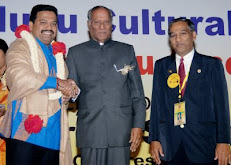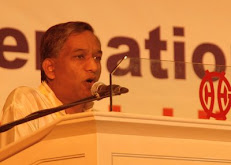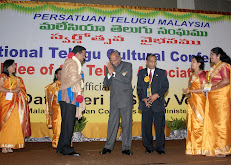ACCORDING to some records in the National Archives, libraries, museums and other individual sources, Telugu emigrants first arrived in Malaysia as agriculture workers for private enterprise from Mauritius Island in the Indian Ocean.
The labourers were originally to be sent to Malaysia but were taken to Mauritius instead, much to their disappointment! They were sent to work in the sugar cane plantations there, and this was in the year 1835.
Original registers if immigrant labour exhibited for public information at the Mahatma Gandhi Memorial hall in Mauritius have been preserved at our national Archives in Malaysia.
An article under the heading leading Telugus in Early Malaya published in the New Straits Times on Sept 24, 2001, states that the first Indian Association in Malaya was initiated by a Telugu, A.Subbiah Naidu, in Penang in 1892.
The article, written by history professor Datuk Dr.Khoo Kay Kim of the University of Malaya said that and another branch of the Indian Association was established in Taiping in 1894. This branch was headed by M.A.C. Rao.
Organized migration
However, the Indian Association was not an active movement, and so one reverend Raju Naidu stepped in and inspired the movement. He revived the one at Taiping, which had ceased functioning, in April 1906.
Two other prominent Telugu gentlemen, J, AppaRao and V.Rajagopal Naidu, joined as committee members. Rev. Raju Naidu went on to register the association in Taiping as the Indian Association of the FMS, on April 1906. He formed another branch in lpoh on June 9, 1906 with 12 members. Sengarayan Naidu, a wealthy contractor from lpoh, contributed generously towards the association which was named the Kinta Indian Association (KIA). It remains active to this day. Sengarayan contributed much to the local community, not just to the Telugus, and he was honoured for this, In fact, a road in Ipoh- Jalan Sengalrayan- has been named after him.
Under the British Administration of Malaya, representatives from the various ethnic groups were chosen to sit in the Federal and State Councils. One of them was S.H. Veerraswamy, a Telugu who also became an accredited leader of the Indians in Malaya. He was a lawyer and a graduate from the world renowned University of Oxford. Though, few in number, these gentlemen were of an elite class. They strived hard to bring unity to the Indian community, without expecting any reward or personal glory. The Telugus kept a low profile. Many of them who had come to serve in Malaysia prayed significant roles as teachers, traders and businessmen, agricultural labourers and members of various professions.
Immigration from India in an organized manner commenced around 1907, and this was largely as a system of indentured labour to serve the rubber plantations that were rapidly opening up, and as labour for the building of public amenities and the provision of services. Along with them came the more educated group, to serve as clerks, teachers and other professions. The waves of Indian labour to Malaysia for the agricultural plantations and as general labour for public works began increasing so much and there was plenty of exploitation.
The British Administration then attempted to bring some sanity to the process by implementing an organized import of labour”. This took the form of legislation, known as the labour Code of 1912. Under this Code, the Indian immigration Fund was introduced, under which the following facilities were provided to the indentured labourers from South India:
Free passage to the Federated Malay states of Johor, Kedah,Perlis and Kelantan
Expenses for the recruitment of labourers and the maintenance of homes for workers were reimbursed
Quarantine and health facilities were introduced
Depots to process the labourers were maintained at Avadi, Madras, and Nagapatnam in south India and at Penang in the Straits Settlements.
The forgotten ones
Exploitation did not end. Another attempt at organized labour import was made with a fresh Labour Code in 1923, which introduced licenses for the so called Kanganis to authorize agents to recruit labourers under a :manageable: system called the Sanji Labour System.
This method was to better organise the collection of funds and make disbursements as duly authorised under the provisions of the 1912 Labour Code. However, the exploitations never ended, and in 1938 the Government of India decided to cease to allow emigration to the Far East.
Today, many Malaysians of Indian origin as well as those of other races may not know how the early Indian settlers suffered in the developing countries. They came from a fairly good life, hoping for better times. However, it dawned on them, especially those in the plantation sector, that they were just the “slaves” of a system devised to stifle their spirit.
They were provided with poor housing, unhygienic sanitary conditions, long working hours, poor wages and the list goes on. Many untold miseries were suffered by them, and inhumane abuses were hurled at them. They toiled on, undaunted, undeterred. They put up with oppression, suppression, poverty and sickness- what immigrants through out the history of mankind have faced. It was their tenacity of spirit in the face of hardship that saw them through to making immense contributions to the growth, progress, development and prosperity of Malaysia.
Telugu Association
In 1955 the Telugu community formed an organization called as Malaya Andhra Sangamu on 17th July 1955 , changing it later on 16th December 1963 and later on from 1983 as TELUGU ASSOCATION OF MALAYSIA (TAM), which is also known as Malaysia Telugu Sangamu or as Persatuan Telugu Malaysia in the national language. The principal objective of the Telugu Association of Malaysia is to unite and merge the Telugus of the country under one roof in an effort to promote the language and culture of the community, their interests and general well being and to foster goodwill and racial harmony among the communities of Malaysia. TAM is serving about 300,000, Telugu population in this country. There are, to date 26 branches nationwide.
Among its endeavours of TAM is Saamskruthika Nilayam (TSN), a cultural centre for Telugus situated in Serendah, Hulu Selangor which is purely depending on well wishers and donors. To name a few other ownerships, TAM has one Sri Venkateswara Temple at Sungai Sumun, Perak, a five storey building(Telugu Bhavanamu) in a strategic location in Kuala Lumpur, a three storey building in Kulim, an office space in Rawang, Ipoh, Skudai,Johore and a single storey building at Klang are among some of the assets in its possession. Specifically, the TAM has become a reality in the making and we are confident that others will play an effective role in making this project a SUCCESS.
PTM operates from its own premise at No 9-1A Udarama Complex, Telugu Bhavanamu, Jalan 1/64A off Jalan Ipoh, 50350 Kuala Lumpur, Malaysia.
Telugu Education in Malaysia
In 1960's there were more than 60 National Type Primary Telugu Schools in Malaysia .These schools were in Perak,Selangor,Negeri Sembian,Kedah, Johore and Pahang, as wherever there were heavy pockets of Telugu population.
Malaysian Secondary School Entrance Examination was then conducted in these schools just like in other primary schools. From 1985 till 1986, Telugu language was offered in OSC/MCE level while from 1968-1992 Telugu language was offered as an optional subject in LCE/PMR examination.In 1991 the Education Director then announced that optional papers such as Punjabi,Telugu and French would no longer be offered from 1993. because they were not in the Integrated Secondary School Curriculum but these subjects would be offered at SPM level. It was strange that Telugu language was taken away in LCE/PMR but to be offered at SPM level. But the Telugu Community was greatly disappointed when the promise to offer Telugu at the SPM level was not implemented. Till to date the Telugu language is not offered either at PMR or SPM level. Article 152(1)(b) of the Federal Constitution guarantees to teach or learn any other language.
Since 1993 no examinations were held for Telugu language. As a result, there was no incentive or motivation for the students to pursue the subject. Being already overburdened with exam oriented subjects, the students and even parents find it a burden for their children to attend the Telugu classes being a non-exam subject. Hence, the number of pupils attending Telugu Classes/Pupils own language (POL) had much dropped. But whatever case Telugu is still been taught at about 25 government schools.
TAM is encouraging POL classes by conducting voluntary classes in all 26 TAM branches nationwide, holding educational and cultural seminars/workshops and various other activities. But our efforts seem futile at times, especially among the younger generations. We only ask our mother-tongue which was here prior to independence and after independence till 1992 to be reinstated in PMR examination so that Telugu language and culture will not be decimated. Telugus have contributed significantly, to the rich cultural heritage of our nation. Loss of Telugu language and culture will be a dent to the rich cultural heritage of Malaysia. So, by including Telugu language in PMR/SPM it will facilitate our efforts immensely and it will spur us further in the promotion of Telugu language and the students too will be motivated to take the subject.
To maintain our the identity language is a must. It is the soul of our race. Your action will save the survival of Telugu community. TAM has faith and confidence in you that you’ll not let Telugu language and culture to become extinct in this lovely land. We have appealed to the Ministry of Education and the cabinet to reinstate Telugu language in PMR/SPM
Newsletter
The TAM’s newsletter ‘ Sanga Charyulu’ is published quarterly and carries news about the regional activities of the persatuan in both Telugu and English. Vice President Sri P S Ramunaidu compiles and edits the articles before distributing the newsletter to all branches.
Radio & Tv
About 1 ½ hour Telugu programmes daily are except on Sunday. During festive seasons especially Telugu New Year Ugadi special programmes were initiated and aired over national Radio Minnal FM and Tv Telugu songs request via SMS is on every Monday from 3.30pm to 4.30pm – MV space…..(message)…. 32770
Presently TV 2 has been screening three Telugu movies yearly. However for last two year only two Telugu films were screened. TAM has been appealed to the authorities.
Astro being a private pay R/TV station, it telecast Telugu movies and a drama serials weekly. TAM has been appealing to increase the frequency of the Telugu movies and daily serials.
MitV another second private pay channel has brought Maa TV, a Telugu channel from Andhra Pradesh and has been operational from 5/9/2005 in Klang Valley. The Telugus living away from Klang Valley are impatiently waiting to receive this Telugu channel.
SREE VENKATESWARA TEMPLEAnnually the Sree Venkateswara Temple at Sungai Sumun, Perak of TAM Lower Perak branch conducts Dasara and other festivals.
Telugus in Malaysia Politics
Among all the Telugus who are in politics, a number of them are found in number of committees and YB K R A Naidu is the only state assembly representative.
TAM also aims to encourage the use of the Telugu language in the country and to popularise Telugu literature and culture. It recognizes that attention is needed to revive, promote and expand cultural activities throughout the country.
It is now hoping to compile statistics of the Telugu populations in Malaysia, in order to use this information as bargaining power when meeting the authorities to seek opportunities for the Telugu people, which are believed to number around 300,000 in Malaysia.
The association is also initiating several activities to raise funds in order to assist needy Telugu students to pursue tertiary education, locally and abroad. Another project of the association is to encourage the active participation of Telugu in business and in national youth programmes.
It plans to begin research to write the history of Telugu immigration to Malaysia and the contributions and achievements of early Malayan Telugus.
_________________________________________________________________
I I wrote the when I was the Secretary General of TAM with reference to "A historical Background of Telugu Migration to Malaysia from India" and edited by S. N Raj





.jpg)
.jpg)
.jpg)
.jpg)
.jpg)

